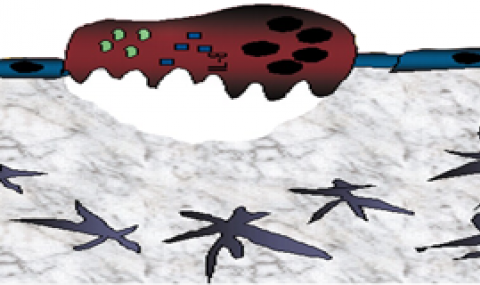Anti-CXCR4 activity of human beta-defensin-3 (hBD3) in vitro (Feng Z et al, J Immunol, 2006) suggests involvement of innate immunity in mobilization of hematopoietic progenitor cells (HPC).
Utilizing a multistep docking approach based on CXCR4 crystal structure and experimental validation, we found that hBD3 and its murine ortholog beta-defensin-14 (mBD14) as well as short hBD3-derived peptides hBD3p and hBD3cp and mBD14-derived peptide mBD14p specifically bind to CXCR4.
Moreover, in vitro experiments, in which enriched mature and immature leukocytes were analyzed, revealed that all these peptides inhibited CXCR4 signaling, CXCL12-induced migration and HIV-1 infection. However, by analyzing bone marrow (BM) stromal cells in vitro, we unexpectedly found that all these peptides, with the exception of hBD3cp, triggered CXCR4 signaling and enhanced the secretion of functional CXCL12. Based on these findings and our previous published results with AMD3100 (Dar A et al, Leukemia, 2011; Golan K et al. Blood, 2012), we hypothesized that hBD3p and mBD14p, but not hBD3cp, would induce HPC rapid mobilization in vivo. Indeed, a single injection of hBD3p, mBD14p or AMD3100 in mice induced preferential mobilization of HPC within 1 hour.
This mobilization was accompanied by enhanced CXCR4 signaling in both HPC and BM stromal cells, CXCL12 secretion in the BM followed by its release to the circulation, and activities of serine proteases MMP-9 and uPA. As expected, hBD3cp failed to induce HPC mobilization. These observations point out an active involvement of BM microenvironment in rapid HPC mobilization induced by CXCR4 antagonists such as AMD3100 and the innate immunity components.
Additionally, we demonstrated that neutralizing anti-CXCR4 or anti-CXCL12 antibodies as well as JNK or ROS inhibitors abolished hBD3p and AMD3100-induced HPC mobilization and CXCL12 release. These data emphasize the active nature of HPC mobilization process rather than just disruption of interactions between CXCR4 expressing HPC and CXCL12 expressing BM stromal cells by CXCR4 antagonizing agents. In conclusion, our results suggest that anti-CXCR4 agents including beta-defensins, which antagonize CXCR4-mediated leukocyte activity in vitro, induce HPC mobilization in vivo via activation of CXCR4 signaling in both HPC and BM stromal cells followed by CXCL12 secretion by BM stromal cells and its release to the circulation as part of rapid mobilization process.



